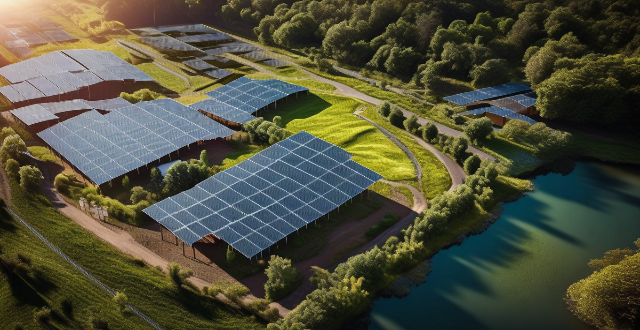Solar energy is generated through the use of solar panels containing photovoltaic cells, which convert sunlight into electricity via the photovoltaic effect. This process involves absorbing sunlight, exciting electrons to a higher energy level, generating an electrical current, collecting it, and converting it into usable AC electricity. Solar energy is renewable, sustainable, cost-effective, and environmentally friendly, but its effectiveness can be reduced by weather conditions, and it requires additional equipment for energy storage. Despite high upfront costs, solar energy systems can lead to long-term savings on utility bills.

How Does Solar Energy Work?
Solar energy is harnessed through the use of solar panels, which are made up of photovoltaic cells. These cells convert sunlight into electricity by using the photovoltaic effect. Here's a detailed breakdown of how solar energy works:
The Photovoltaic Effect
The photovoltaic effect is the process by which solar cells convert sunlight into electricity. When sunlight hits a solar cell, it knocks electrons loose from their atoms. This creates an electrical charge that can be captured and used as energy.
Key Components
- Photons: Particles of sunlight that hit the solar cell.
- Electrons: Negatively charged particles that are knocked loose by photons.
- Atoms: The building blocks of matter, composed of protons, neutrons, and electrons.
Steps in the Process
1. Absorption: Sunlight hits the solar panel and is absorbed by the photovoltaic cells.
2. Excitation: The energy from the sunlight excites the electrons in the cells, causing them to move to a higher energy level.
3. Current Generation: The movement of these excited electrons creates an electrical current.
4. Collection: The electrical current is then collected and sent to an inverter, which converts it into usable alternating current (AC) electricity.
5. Utilization: The AC electricity can now be used to power homes, businesses, and other structures.
Benefits of Solar Energy
- Renewable: Solar energy is a renewable resource, meaning it will never run out like fossil fuels.
- Sustainable: It is a sustainable source of energy because it does not produce harmful emissions or pollutants.
- Cost-Effective: While there is an initial investment for installing solar panels, they can save money on energy bills in the long run.
- Environmentally Friendly: Using solar energy reduces our reliance on non-renewable sources and helps combat climate change.
Limitations of Solar Energy
- Weather Dependency: Solar panels require sunlight to generate electricity, so their effectiveness can be reduced on cloudy or rainy days.
- Storage: Storing excess energy for use during nighttime or periods without sunlight can be challenging and requires additional equipment such as batteries.
- Upfront Costs: The initial cost of installing a solar system can be high, although this is often offset by savings on utility bills over time.
In conclusion, solar energy works through the conversion of sunlight into electricity by utilizing the photovoltaic effect in solar panels. It offers numerous benefits but also has some limitations to consider when deciding whether to invest in a solar energy system.